SirT3 suppresses hypoxia inducible factor 1α and tumor growth by inhibiting mitochondrial ROS production
- PMID: 21358671
- PMCID: PMC3134877
- DOI: 10.1038/onc.2011.37
SirT3 suppresses hypoxia inducible factor 1α and tumor growth by inhibiting mitochondrial ROS production
Abstract
It has become increasing clear that alterations in cellular metabolism have a key role in the generation and maintenance of cancer. Some of the metabolic changes can be attributed to the activation of oncogenes or loss of tumor suppressors. Here, we show that the mitochondrial sirtuin, SirT3, acts as a tumor suppressor via its ability to suppress reactive oxygen species (ROS) and regulate hypoxia inducible factor 1α (HIF-1α). Primary mouse embryo fibroblasts (MEFs) or tumor cell lines expressing SirT3 short-hairpin RNA exhibit a greater potential to proliferate, and augmented HIF-1α protein stabilization and transcriptional activity in hypoxic conditions. SirT3 knockdown increases tumorigenesis in xenograft models, and this is abolished by giving mice the anti-oxidant N-acetyl cysteine. Moreover, overexpression of SirT3 inhibits stabilization of HIF-1α protein in hypoxia and attenuates increases in HIF-1α transcriptional activity. Critically, overexpression of SirT3 decreases tumorigenesis in xenografts, even when induction of the sirtuin occurs after tumor initiation. These data suggest that SirT3 acts to suppress the growth of tumors, at least in part through its ability to suppress ROS and HIF-1α.
Figures
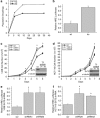
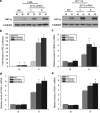


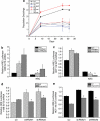
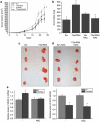
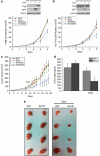
References
-
- Adler V, Yin Z, Tew KD, Ronai Z. Role of redox potential and reactive oxygen species in stress signaling. Oncogene. 1999;18:6104–6111. - PubMed
-
- Bakker WJ, Harris IS, Mak TW. FOXO3a is activated in response to hypoxic stress and inhibits HIF1-induced apoptosis via regulation of CITED2. Mol Cell. 2007;28:941–953. - PubMed
-
- Bellizzi D, Rose G, Cavalcante P, Covello G, Dato S, De Rango F, et al. A novel VNTR enhancer within the SIRT3 gene, a human homologue of SIR2, is associated with survival at oldest ages. Genomics. 2005;85:258–263. - PubMed
Publication types
MeSH terms
Substances
Grants and funding
LinkOut - more resources
Full Text Sources
Other Literature Sources
Research Materials

